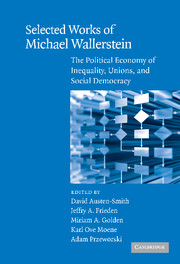 Selected Works of Michael Wallerstein
Selected Works of Michael Wallerstein Published online by Cambridge University Press: 27 January 2010
The combination of private ownership of the instruments of production with representative political institutions based on widespread suffrage constitutes a compromise between workers, who consent to the private appropriation of profit by owners of capital, and capitalists, who accept the democratic institutions through which workers can make effective claims for an improvement of their material conditions.
This form of societal organization was considered to be inherently unstable by Marx, who believed that capitalist democracy is “only the political form of revolution of bourgeois society and not its conservative form of life,” (1934, p. 18) “only a spasmodic, exceptional state of things … impossible as the normal form of society.” (1972, p. 198) Once introduced, Marx thought, political democracy would either be extended to the “social realm” by workers nationalizing the means of production or subverted by capitalists using the ownership of capital to restore their political power. Yet in many countries, capitalist democracy has persisted over long periods of time.
Marx's predictions may have been false for at least two distinct reasons. His followers have tended to accept a model of conflict in which interests of classes are irreconcilably opposed to each other, a model that implies that workers should always be hostile to capitalism and capitalists. If this model is correct and if capitalism nevertheless survives in its democratic form, it must be the result of the activities of some institutions, typically thought to be the state, which provide physical repression, ideological domination, cooptation of workers' leaders, or whatever else is necessary to perpetuate capitalism in the face of the permanent threat posed by workers.
To save this book to your Kindle, first ensure [email protected] is added to your Approved Personal Document E-mail List under your Personal Document Settings on the Manage Your Content and Devices page of your Amazon account. Then enter the ‘name’ part of your Kindle email address below. Find out more about saving to your Kindle.
Note you can select to save to either the @free.kindle.com or @kindle.com variations. ‘@free.kindle.com’ emails are free but can only be saved to your device when it is connected to wi-fi. ‘@kindle.com’ emails can be delivered even when you are not connected to wi-fi, but note that service fees apply.
Find out more about the Kindle Personal Document Service.
To save content items to your account, please confirm that you agree to abide by our usage policies. If this is the first time you use this feature, you will be asked to authorise Cambridge Core to connect with your account. Find out more about saving content to Dropbox.
To save content items to your account, please confirm that you agree to abide by our usage policies. If this is the first time you use this feature, you will be asked to authorise Cambridge Core to connect with your account. Find out more about saving content to Google Drive.